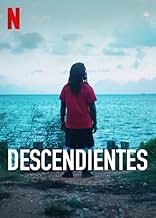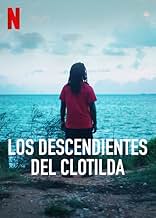VALUTAZIONE IMDb
7,1/10
1524
LA TUA VALUTAZIONE
I discendenti degli schiavi africani giunti in Alabama nel 1860 cercano giustizia e conforto dopo il rinvenimento dei resti della nave che aveva trasportato i loro antenati.I discendenti degli schiavi africani giunti in Alabama nel 1860 cercano giustizia e conforto dopo il rinvenimento dei resti della nave che aveva trasportato i loro antenati.I discendenti degli schiavi africani giunti in Alabama nel 1860 cercano giustizia e conforto dopo il rinvenimento dei resti della nave che aveva trasportato i loro antenati.
- Premi
- 7 vittorie e 24 candidature totali
Recensioni in evidenza
Interviewing a bunch of relatives of slaves who just want reparation's for something their great great great grandparents went through. People they never met nor spoke to. Sad that the memory of the people who went through slavery has been reduced to this. The slaves remained strong through humility. They had Christ in their lives and God delivered a people who put their faith in Him. To try to capitalize on a situation like this by making a documentary based on the telephone game mentality of people who honestly are so far removed from the situation any testimony given will be self centric in nature is appalling. Should you ask Caucasian Americans with Italian decent about the roman empire? I think not.
Slavery was one of the most important, and most disgraceful, parts of US history. Most of the focus on it emphasizes the plantations, the whipping of the enslaved African-Americans, and the Underground Railroad. A lesser known part is the slave trade itself. Outlawed in 1808, it continued in secret. The last ship to bring kidnapped Africans to the United States was the Clotilda, which docked in Mobile, Alabama, before getting sunk to hide its violation of the ban on slave-trading.
Margaret Brown's "Descendant" focuses on this, as well as the descendants of the enslaved people on the Alabama coast. It's a fascinating look at the aftermath of slavery, and how the descendants of the slaveowners are the biggest landholders in the area. Not to mention the chemical refineries dumping all sorts of toxins.
This is not a documentary that you'll forget anytime soon. I recommend it.
Margaret Brown's "Descendant" focuses on this, as well as the descendants of the enslaved people on the Alabama coast. It's a fascinating look at the aftermath of slavery, and how the descendants of the slaveowners are the biggest landholders in the area. Not to mention the chemical refineries dumping all sorts of toxins.
This is not a documentary that you'll forget anytime soon. I recommend it.
The polluting factories and the highway that destroyed the Downtown area of Africatown are just other facts that help validate what the descendants are saying. Historians use oral histories as part of their research - this is a common practice. A lot of people don't want you to see this documentary. They are afraid of how it will make them look. They are afraid that it will explain someone's situation. This is one of the reasons I watched the documentary. It explains so much about the Bible Belt south. If you care about American history at all, you will find this documentary rewarding. Watch it and decide for yourself.
Contrary to widely held belief, just because the US slave trade was outlawed in 1808, that didn't end attempts to continue to import African slaves thereafter. It wasn't until 1860, when the last slave ship, the Clotilde, entered American waters with a hold full of slaves that the practice finally came to an end. And, to conceal this crime, which was punishable by death, the perpetrators scuttled the ship by burning it upon arrival. The location of the wreckage long remained a mystery until a diving team found it in shallow water just north of Mobile, AL in 2018-19. But the discovery was more than just an archaeological curiosity; it was also significant to the descendants of the Clotilde slaves, many of whom settled in a nearby community called Africatown when they achieved freedom after the Civil War in 1865. Those living today now have actual proof of their African lineage, as well as evidence of the crime that was committed against their ancestors. Director Margaret Brown's fourth feature outing explores this story from multiple angles in terms of its historic and personal importance, as well as from all of the fallout that stemmed from their ancestors' experience that has carried through to this day. Given the myriad threads presented in this documentary, the focus admittedly could have been a little tighter in spots, particularly in terms of how the narrative's many dots connect. But, that aside, the film effectively chronicles a little-known story that represents a significant benchmark in African-American history and a potential turning point in terms of how the American public at large views the question of this appalling institution and its after-effects, some of which have lingered but have gone virtually unaddressed and, arguably, even unrecognized all these years. This is a fine film that should be part of every grade school history class and a welcome addition to African-American History Month viewing.
This documentary is top notch. As anyone who has ever looked into their family history can tell you, the single most important resource genealogists have available to them is descendants. Many of us remember family stories passed to us from our parents & grandparents and many of those stories were passed to them by their parents & grandparents. In many cases the only historical records available are those stories passed generation to generation. The Christian Bible is a prime example of the importance of those stores passed thru the generations. The first Bible began taking shape about 600 years after the death of Christ so one can reasonably assess that the entire Christian Bible is based on stories passed down from generation to generation to generation. Is it possible that one, or more, of those story tellers might have exaggerated a bit? Probably - Just as the story of Lincoln scribbling the Gettysburg Address on the back of envelope isn't true. It is even possible the person documenting the story exaggerated for some reason - maybe even to make their story more appealing or even to satisfy a financial sponsor as with Washington's cherry tree story. In any case, the slaves brought over on the Clotilda deserve to be remembered and as with the Bible, each of us is free to determine what we believe.
I più visti
Accedi per valutare e creare un elenco di titoli salvati per ottenere consigli personalizzati
- How long is Descendant?Powered by Alexa
Dettagli
- Tempo di esecuzione1 ora 49 minuti
- Colore
- Mix di suoni
Contribuisci a questa pagina
Suggerisci una modifica o aggiungi i contenuti mancanti

Divario superiore
What was the official certification given to Descendant - L'ultima nave schiavista (2022) in Brazil?
Rispondi






















